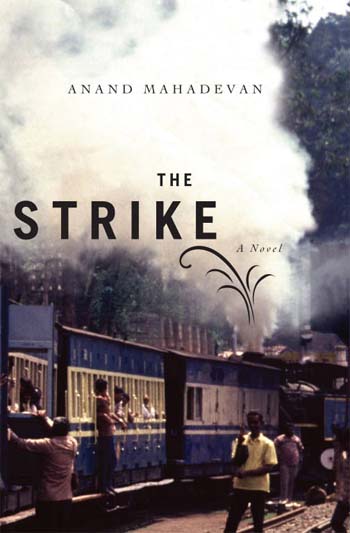Apr 14, 2025
Apr 14, 2025
 Anand Mahadevan moved to the US from India when he was 17. But Tamil Nadu, where he grew up, stayed with him like a snapshot from childhood. Years later, the writer has managed to recapture some of it in his debut novel "Strike".
Anand Mahadevan moved to the US from India when he was 17. But Tamil Nadu, where he grew up, stayed with him like a snapshot from childhood. Years later, the writer has managed to recapture some of it in his debut novel "Strike".
"The inspiration for 'Strike' was in fact an actual strike that stopped the Tamil Nadu Express in Ennore station on Christmas eve in 1987. I was nine years old that year, travelling with my parents and my brother in the train and even today, I can remember the smells of that stagnant train in that small station for hours," Mahadevan told IANS in an e-mail interview.
The novelist, who teaches creative writing at Humber College at the University of Toronto, recalled that the "water had run out of the compartment and the staff in the pantry car had barricaded themselves when the food ran out".
"As a nine-year-old, who was convinced that his parents knew the solutions to all the problems in the world, it was my first foray into the world of adults nervous at the loss of their power. As I grew up, I often remembered that day, the heat building up in the compartment, the lack of information and the swirls of rumors. I have always known that I would take that moment and explore it in my writing," Mahadevan said.
"Strike", a bold debut, is the story of 12-year-old Hari who tries to make sense of his tumultuous and complex world of 1980s India. His experiment of eating fish leads to the death of his grandmother. His preference for Hindi over his mother tongue Tamil leads to slanderous graffiti against his family in Chennai. His friendship with the household help lands him in trouble with a militant politician called Vishu.
Matters come to a head when MGR, the Tamil film star-turned-politician, dies and his supporters led by Vishu declare a strike, trapping Hari and his mother in a train bound for Chennai. When the protesters try to take over the engine of the train, Hari's attempts to help have tragic results.
The book has its erotic moments. When tension simmers outside the train, the adolescent Hari experiences the first stirrings of sexual desire in the company of aspiring actor Mukund and a transsexual, Radha.
"Yes, the book has elements of eroticism. There is the sexuality of children (which we adults sometimes like to deny) and the sexuality of adults that scares Hari till he meets the actor. In the eighties, my experiences and those of my friends were that our parents worried more about boys meeting girls and vice-versa.
"Consequently, the normative experience was homosocial (same sex friendships). And so in the burgeoning sexual desire of puberty, Hari finds a model of eros in the actor and the counter-model in the eunuch Radha, to whom he is drawn," Mahadevan says.
Mahadevan, who has used Tamil icon MGR's death as a watershed in his narrative, is fascinated by how people of all classes enjoy Tamil movies.
"How the women cried in living rooms as they watched a movie with MGR in it, but out on the streets, they had nothing in common with the gardeners, rickshawallahs and the young unemployed who formed the bulk of his film clubs," the writer said.
The book, explains Mahadevan, also draws sustenance from the fact that social interactions in Tamil Nadu "are charged by crowds pouring out of theatres and bringing with them the passion and drama of the silver screen to the streets and lives".
The writer has trouble pinning down his book as "a particular type".
"Recently, my novel was adapted for the stage as a play by the award-winning American playwright Rebecca Nesvet and when I saw it performed in New York, I was shocked at how the actors created a sense within me - what will happen next, I wondered to myself," he said.
For some, "Strike" is a story of growing up and for others, it is a criticism of Indian society. "I am grateful that it works as a novel for many of my readers," Mahadevan says. The book was published by Penguin India.
24-May-2009
More by : Madhusree Chatterjee